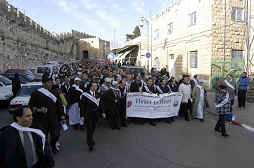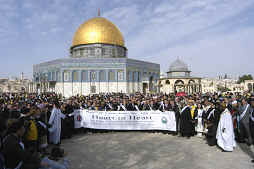The Middle
East Peace Initiative, sponsored by the Interreligious and
International Federation for World Peace (IIFWP), has for more than one
year been sponsoring pilgrimages to
the Holy Land, making great strides in interreligious reconciliation
and cooperation among the religions and ethnic groups of that precious
historical area. World Peace Pilgrimage - September 2004 Three Abrahamic Faiths Candlelight Vigil and Prayer Commemorating
September 11 Repentance and Forgiveness Ceremony at
Yad Vashem Participants visit the newly built
border wall separating Jews and Palestinians Heart to Heart - Peace
Walk & Cultural Program During this summer of 2004 IIFWP has called the
world – all seven continents – to come to History of the IIFWP formally launched its Middle East Peace Initiative (MEPI) with
an international consultation held on February 27-March 2, 2003, in
Peace-building has not been approached from this angle in any
substantial way before. IIFWP initiated a
unique process that starts from the most “internal” points of
convergence—from the most profound and critical convictions that
Jehovah/God/Allah is the one Origin and Source of all, and whose Will is for
peace and prosperity, not for violence, poverty or hatred. This becomes the
core and starting point for the peace process. Grounded in the above fundamentals, IIFWP’s efforts at this time could
best be described as “The Restoration of the Family of Abraham” and has three
components: Component I: includes consultations, conferences, roundtables,
grassroots programs, peace walks and seminars, giving all people the opportunity
to come together on “common ground”—recalling our common origins, convergent
aspirations and unique contributions as individuals and members of various
religions and nationalities. By establishing our common origins, ancestry and
desired destination (a world of peace), and by recounting that we are all
acting within a set of universal principles at play in our lives, we can then
start another critical part of the process. Component II: seeks to establish recognition of accountability to a
“higher” source—one to whom all are equally accountable. By recognizing past
grievous actions on all sides, what becomes most critical is that each person
commits to constructive, self-giving preventive actions rather than
resentment and revenge. To accomplish this phase quite literally requires
each person to genuinely turn and face their God. Then to seek and adopt that
point of view as their own, as a sign of submission to, or faith in, or
obedience to Him. Component III: builds solidarity to strengthen the tenuous “new
beginning” of the first two phases. Actions will take the form of
interreligious and international cooperation guided by the needs of the
“larger good.” In other words, we will start to see the emergence of one
“family of Abraham” seeking the greatest opportunities for peace and
prosperity for all in the region. Heart-to-Heart Rally for Peace Historically enlightened religious leadership has been crucial to the
advancement of justice and morality, from the movements to abolish slavery
and end colonial oppression to the movement for civil rights. Why do we march
and rally for peace? In biblical times, Joshua led the Israelites on a march
around the city of We, too, share a dream, and if we march together as never before in
history we, too, can “bring down the walls” of resentment, prejudice and
hatred, heal the wounds of war, and change the course of history. Whether
Jewish, Moslem, Christian or Druze, the leaders of the world, and all who
love and long for peace, will demonstrate that the power to create peace lies
in the hands of those of us who truly love God and love our fellow human
beings, those who will to join us to proclaim with one voice, “Peace! Shalom!
Salaam Alaikum!”
IIFWP sees peace as the establishment of a permanent condition of
prosperity, joy, equality of opportunity, and respect for every person and
every family. It is predicated upon the removal of enmity and historical
resentment. Peace is characterized by giving more than receiving, a common
respect for the origin of life, and by a life lived for the greater social
good and support for all. The key to peace lies with God, who is the Parent of humankind and the
Revealer of each of the monotheistic religions. Therefore, an essential
precondition for peace is reconciliation among religious leaders of Judaism,
Christianity and Islam, along with their commitment to work in solidarity for
peace and understanding among their peoples. Violence and conflict form the
saddest chapters of human history. IIFWP encourages parties to express their
legitimate grievances in non-violent ways as part of a social dialogue aimed
at helping the sides to understand each other and to have compassion for each
other’s suffering. Religious leaders and believers are those whom history would expect to
respond first and having opened the way, would then encourage others to
follow. The accomplishment of peace is in large part a spiritual undertaking.
Good will and trust must be generated in order to change the political atmosphere
and to give governments the political will to make the sacrifices that
meaningful peace entails. This calls for leadership from religious leaders to
generate a spiritual atmosphere of reconciliation and good will. Political
and social leaders, educators and the media, should collaborate with
enlightened religious leaders to promote and extend that spirit throughout
the society. Partnerships
for Peace
New hope needs to be installed in the hearts and minds of the
religious leaders no less so than in the hearts and minds of all people,
including political leaders. This is where the support from international
religious leaders is so important; they can catalyse the process. Much of the preliminary work of the MEPI has been to create the
necessary international support system and foundation for the overall IIFWP
strategy. Without this tremendous level of support from outside, those in the
region will not be able to take the necessary, life-threatening steps to
peace. The support that comes from “outside” must be a total investment, i.e.
“at the cost of their lives.” Otherwise, it will not be taken seriously.
Persistence, commitment, sacrifices are needed. Financial sacrifices are
needed to enable this process and mobilization to move forward, just not from
governments, but from the people and families all over the world. Under the banner of the IIFWP, a series of gatherings and peace walks
“re-establishing the Family of Abraham” will take place, binding together
hearts, families, nationalities—and faiths—in partnerships for peace. For further
information please contact your IIFWP chapter: Austria: Seidengasse 28, A
1070 Wien |






